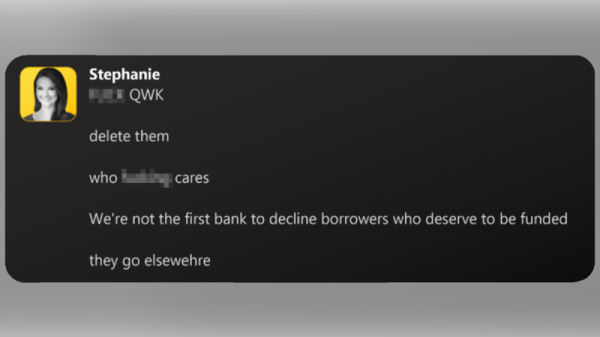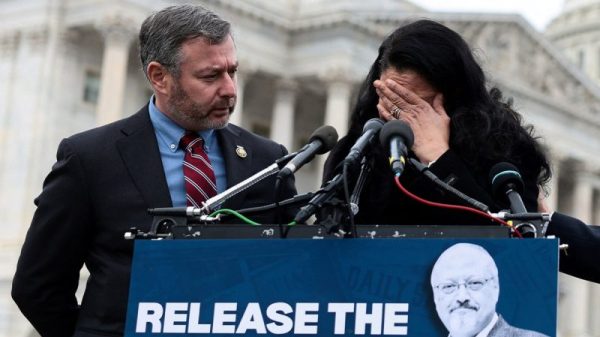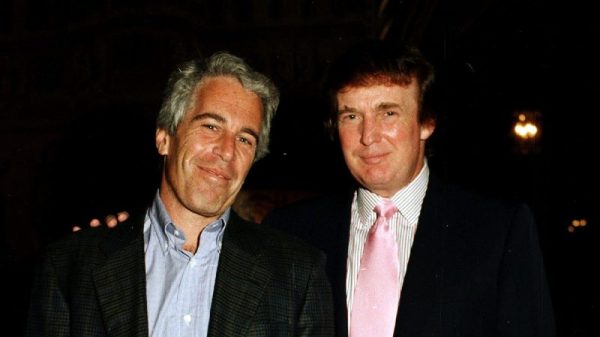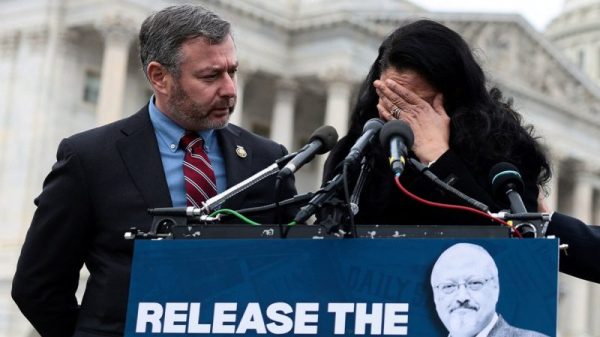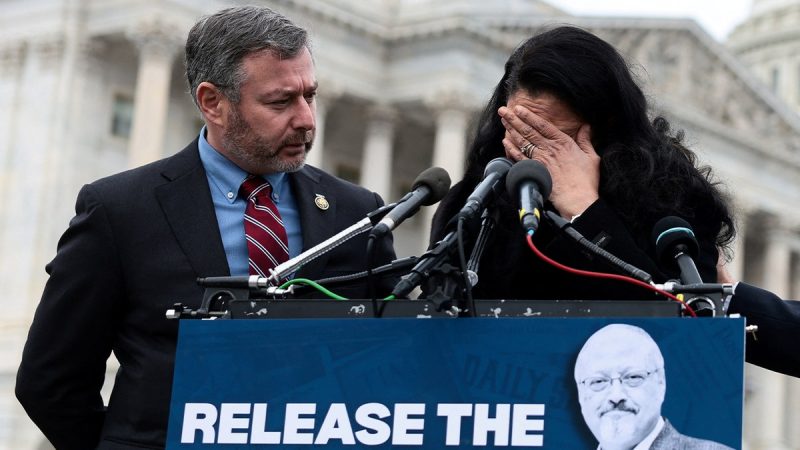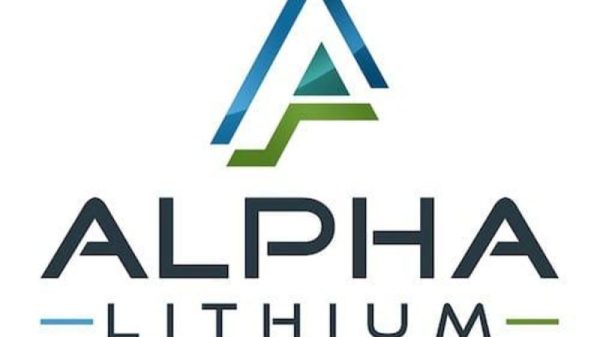Rep. Eugene Vindman, D-Va., is demanding that President Donald Trump release a 2019 call with Saudi Crown Prince Mohammed bin Salman, saying the American people ‘deserve to know what was said’ in the aftermath of Jamal Khashoggi’s murder.
Vindman, a retired Army colonel who once served on Trump’s National Security Council, said the call was one of two that deeply concerned him — the other being the 2019 conversation with Ukrainian President Volodymyr Zelenskyy that triggered Trump’s first impeachment.
Standing beside Hanan Elatr Khashoggi, the slain journalist’s widow, Vindman said Trump ‘sidelined his own intelligence community to shield a foreign leader’ and that transparency is owed to both the Khashoggi family and the country.
‘The Khashoggi family and the American people deserve to know what was said on that call,’ Vindman said Friday. ‘Our intelligence agencies concluded that Crown Prince Mohammed bin Salman ordered the murder of Mr. Khashoggi’s husband. When the president sidelined his own intelligence community to shield a foreign leader, America’s credibility was at stake.’
Vindman’s name already is polarizing in Trump-era politics.
He and his twin brother, Lt. Col. Alexander Vindman, became central figures in the first impeachment attempt against Trump, when their internal reporting of Trump’s Ukraine call led to accusations from conservatives that they had undermined an elected president. To Trump’s allies, Eugene Vindman’s demand to release the 2019 Saudi call feels like a replay of that fight — another attempt by a former National Security Council insider to damage the president under the banner of transparency.
Still, his comments land at a revealing moment. Washington’s embrace of bin Salman underscores a familiar trade-off in U.S. foreign policy: strategic security and economic interests over accountability and human rights.
Secretary of State Marco Rubio said: ‘The U.S.-Saudi friendship is now a partnership for the future. President Trump’s historic agreements with the Kingdom of Saudi Arabia, from defense to investment, will create quality jobs for Americans and will grow our economy. No virtue-signaling. No lecturing. Only results for the American people.’
White House relations
Trump’s latest visit with bin Salman brought sweeping defense and investment deals, even as questions over 9/11 and Khashoggi’s murder continue to test that balance. The United States granted Saudi Arabia major non-NATO ally status, formally elevating the kingdom’s defense and intelligence partnership with Washington and clearing the way for expedited arms sales and joint military programs.
Bin Salman also pledged nearly $1 trillion in new Saudi investments across U.S. industries, including infrastructure, artificial intelligence and clean energy. The commitments were announced alongside a Strategic Defense Agreement that includes purchases of F-35 fighter jets, roughly 300 Abrams tanks and new missile defense systems, as well as joint ventures to expand manufacturing inside Saudi Arabia.
Administration officials said the initiatives would create tens of thousands of American jobs and strengthen the U.S. industrial base.
During his appearance with Trump at the White House, reporters shouted questions about Saudi Arabia’s alleged role in the Sept. 11 attacks and the 2018 killing of Khashoggi at the Saudi consulate in Istanbul — marking a rare moment of public pressure on the crown prince, who typically avoids unscripted exchanges with the press.
Trump accused the press of trying to ’embarrass’ his guest, but the crown prince offered what sounded like regret for the killing of Khashoggi, even as he denied involvement.
‘A lot of people didn’t like that gentleman that you’re talking about,’ Trump said. ‘Whether you like him or don’t like him, things happen, but he knew nothing about it … We can leave it at that. You don’t have to embarrass our guest by asking a question like that.’
ABC reporter Mary Bruce had told bin Salman that U.S. intelligence determined he’d signed off on the killing and that 9/11 families were ‘furious’ about his presence in the White House. ‘Why should Americans trust you?’
‘It’s been painful for us in Saudi Arabia,’ bin Salman said of the killing, calling it ‘a huge mistake.’ ‘We’ve improved our system to be sure that nothing happens like that again,’ he added.
A 2021 report by the Office of the Director of National Intelligence stated: ‘We assess that Saudi Arabia’s Crown Prince Mohammed bin Salman approved an operation in Istanbul, Turkey, to capture or kill Saudi journalist Jamal Khashoggi.’
Bin Salman has repeatedly denied approving the killing, though he said in 2019, ‘It happened under my watch, I take full responsibility as a leader.’
Sept. 11, 2001
The question of Saudi Arabia’s involvement in the Sept. 11, 2001, terrorist attacks remains one of the most sensitive and unresolved issues in the U.S.-Saudi relationship. While 15 of the 19 hijackers were Saudi nationals, the U.S. government has never concluded that the Saudi state or senior Saudi officials had prior knowledge of or directed the attacks.
Families of 9/11 victims condemned bin Salman after he invoked Usama bin Laden during his White House remarks, saying the al Qaeda leader used Saudi nationals to drive a wedge between Washington and Riyadh.
‘We have to focus on reality,’ the crown prince said. ‘Reality is that Usama bin Laden used Saudi people in that event for one main purpose: to destroy the American–Saudi relationship. That’s the purpose of 9/11.’
‘The Saudi crown prince invoking Usama bin Laden this afternoon in the White House does not change the fact that a federal judge in New York ruled a few short months ago that Saudi Arabia must stand trial for its role in the 9/11 terrorist attacks that murdered 3,000 of our loved ones,’ said Brett Eagleson, president of 9/11 Justice, a group representing victims’ families.
In August 2025, U.S. District Judge George B. Daniels issued a landmark ruling bringing Saudi Arabia under U.S. federal jurisdiction for a 9/11 trial. The court found evidence of a network of Saudi officials inside the U.S. who allegedly provided logistical support to the hijackers, citing ‘prior planning’ and ‘constant coordination.’
Among the materials described in the ruling was a drawing seized from a Saudi government operative showing an airplane with flight-path equations — evidence prosecutors said suggested advance knowledge of the attacks.
Saudi Arabia has denied any role, calling the allegations ‘categorically false.’
But for bin Salman, who came to Washington seeking to highlight new security and economic ties, the families’ sharp rebuke was a reminder that the 9/11 case still looms large in the public eye, even as the Trump administration deepens its partnership with Riyadh.

